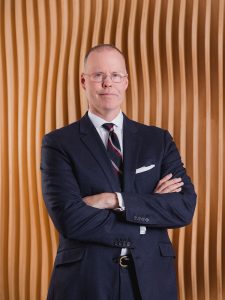DLSPH Open: Learnings from the Pandemic
December 2/2021
Students, Staff and Faculty,
I am asked a lot about what I’ve learned from the COVID-19 pandemic.
In the coming years, with some distance, space and wisdom, I know that profound insights will emerge about our health systems and public health practices that could vastly improve them – if we have the courage to create real change.
The pandemic’s legacy was very much on my mind as I addressed graduating students on Nov. 18.
The first thing I thought about was the place of the political in public health. Not as in ideology or political party. In the ancient Greek definition, politics is simply group decision-making – which makes everything we do in public health political. In public health, we should avoid ideology, but never politics.
Many of us at DLSPH have been deeply involved in providing advice and insights around the pandemic, and have spent a lot of time thinking about the role of evidence in political decision-making – and the responsibility of public health practitioners to our findings. Evidence can be twisted to support an ideology, but evidence inherently never fits into an ideology. Staying true to one’s evidence is one of the best ways to wade the political waters. And working with broad coalitions of expertise ensures that many sets of evidence are considered.
You cannot be neutral when you are focused on evidence – ultimately, you will always come to a conclusion based on the best available facts. But locking into one position can be dangerous as it blinds you to the evidence that may arise as the science improves. Similarly, we need to bring the public with us: helping people to understand when and why the evidence changes is an art and a science. And it’s an area where I feel we in public health have the biggest opportunity to improve.
Good, two-way communications build trust. Unfortunately, in our increasingly siloed information age, we’ve had a hard time reaching entire communities of people with historical distrust of institutions, authority and health systems. During the pandemic, great strides have been made among some communities and very little among others. In the coming months and years, DLSPH researchers will be drilling down to understand much more in this area.
How do we gain trust? It starts by being curious about the people around us. What are their hopes? What are their fears? What are their concerns? How do they live? When we provide public health guidelines, how will their lives be affected? How do we make it easy for them to adhere to public health guidelines?
Gaining trust back for the entire system is a long process but my advice is to stick to your principles, never forget to speak up for the voiceless or be afraid to call out ineffective or outdated practices.
It’s dangerous to see the public health and health care systems as separate entities as if we are in opposition to them. Public health leaders are responsible for championing and arguing for the system, knowing its pitfalls and challenges.
Every actor within this system is living through a balancing act of different pressures which didn’t go away during the pandemic and will certainly not be gone once it’s over.
Public health experts are typically communicating within a narrow slice of their expertise. That’s why the best way to move forward is to come together and build teams with various strengths that can reinforce each other, rather than working in silos. That’s how we can better understand the lived experiences of the communities we serve.
And that’s how we regain trust.
Thank you,
Adalsteinn Brown
Dean and Professor
DLSPH
